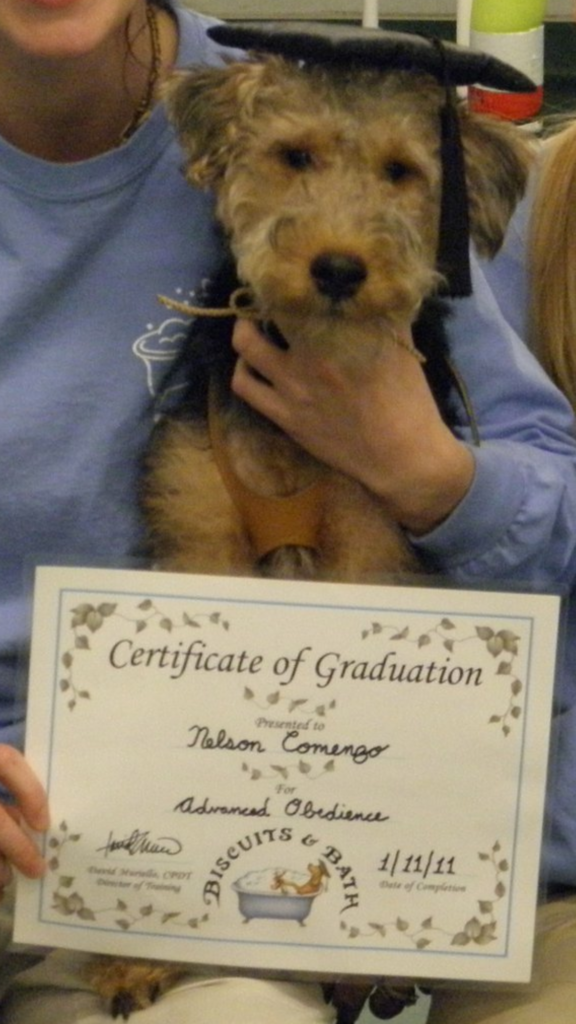06 SepWhat keeps Nelson from biting? A muzzle, a loving owner, and a repertoire of cute tricks

Nelly's first day at School For The Dogs
If you live in the Gramercy area, you may sometimes see our client Nelson and his person, Joanie, hanging out just outside of the Stuyvesant Park dog run. Nelson, a 6-year-old Welsh Terrier has some… issues. He is almost never without his muzzle; unmuzzled, the risk that he will bite Joanie (or someone else, or another dog) is just too great.

Puppy class graduation
Nelson had a great puppyhood with a wonderful owner. He experienced no major traumas that we know of. But, just like in people, sometimes chromosomes get together and funny stuff happens — when you consider the amount of inbreeding that has gone on to make as many dog breeds as we have, it’s amazing that mental illness in dogs isn’t a larger problem than it is in “purebred” dogs. For that, we can thank the work of the world’s good (or lucky!) breeders, helpful trainers, and the country’s small-but-growing veterinary specialty in behavioral medicine for pets.
To many people, the fact that there are dogs receiving the same anti-depressants as many humans comes as a surprise. Some people think medicating a dog for their behavior is indulgent, but when they’re faced with medication as a possible solution to a devastating problem, it’s often a no brainer. New York City, with its packed streets, small living spaces and busy people, can simply be the wrong place for some dogs. You don’t need to talk to a dog to know that walking across Canal Street is stressful! Fortunately, we see tons of dogs at School For The Dogs who can deal just fine with city-life; dogs have evolved to be quite adaptable to our modern lifestyles. But there are also lots of dogs who, due to whatever special brain chemistry they have, could greatly benefit from medication, or else a major lifestyle change (NYC –> Rural home with quiet retired person). Or countryside AND meds. To choose to do nothing for a dog who is suffering due to fear or anxiety (the roots of many of the problems that lead to bites) is to gamble that your dog will live in a state of stress and could perhaps hurt you, himself, another dog or another person. These are dogs that to often end up in shelters, where there are few country-dwelling little old ladies lining up to take dogs who are known to bite.
But most people aren’t going to uproot their lives for their dogs, and many just don’t have access to a vet who is also a psychopharmacologist; NYC’s single veterinary behaviorist, one of only a few dozen in the country, practices out of our studio, where she charges $400 an hour and has a months-long waiting list. But there are two low-cost ways you may help a dog in this situation (or a dog in any situation, really): teaching him to tolerate wearing a muzzle, and fun training.
When his mania began to present itself — for no apparent external reason — several vets recommended that Joanie put down Nelson. He started biting everyone, including her. The way she describes how he was makes me think of people I know with Borderline Personality Disorder: He’d snap often, and without clear triggers. But Joanie loved him and couldn’t consider going that route. Local trainer Erica Lieberman broke it down for her. “If it’s not behavioral, it MUST be medical,” Erica told Joanie, who then set out to find a good veterinary behaviorist.

Nelly came to play ball at SFTD on his birthday.
In the years since, Joanie has found lots of ways to help Nelson live a good life, even if it isn’t the life of your average New York dog. For the last 4 years, she has been giving Nelson 40 mg of Prozac and thyroid extract daily. She keeps him muzzled, even when he is home, unless he is in his crate. She lets him socialize with other dogs through the gate at the dog run. For his birthday, she came to School For The Dogs when it was empty so that she could throw him his ball over and over and over, in a safe, off-leash environment.
One way that Joanie spends time with Nelson, and enriches his days, is through dog training. She has attended some classes with us and is an excellent dog trainer. We love training tricks for many reasons, one of them being that it’s something that is easy to do in the confines of a city apartment, and it doesn’t require a lot of time (usually a minute or two a day will get you far). Here are some of the fun tricks Joanie has been working on with Nelson.



